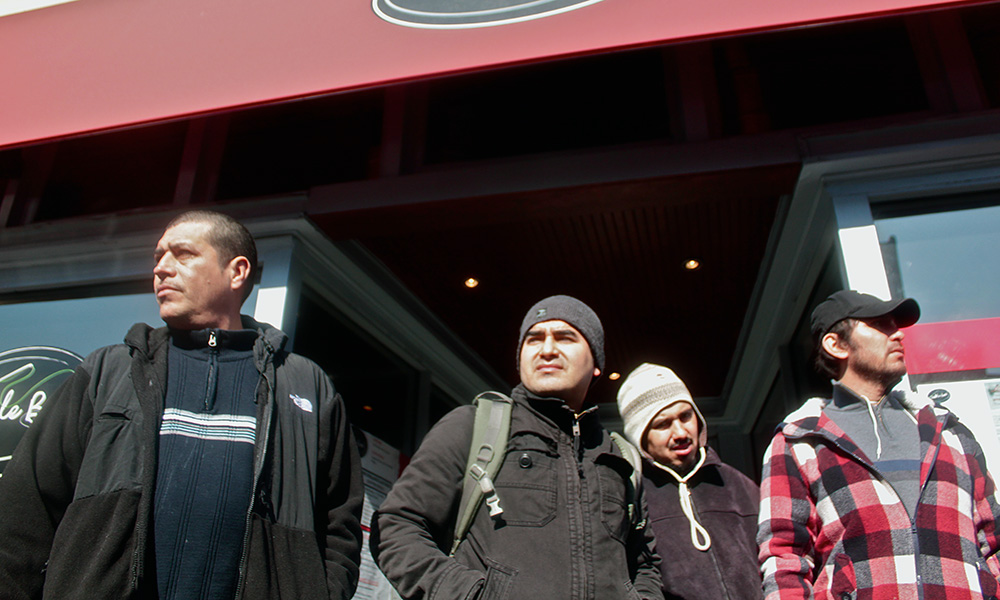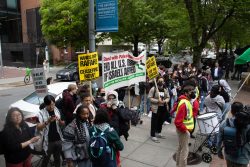Last Monday, March 4, the D.C. Council’s Committee on Workforce and Community Affairs hosted a hearing with the aim of evaluating the performance of the Department of Employment Services. In response, a group of 50 workers and community supporters gathered at the Executive Office of the mayor and the council during the hearing to present Councilmember Marion Barry with a symbolic bill highlighting the increasing cases of wage theft in D.C.
Alongside the workers and the D.C. Wage Theft Coalition, a group of 12 Georgetown students participated in the action as part of the Worker Justice D.C. Alternative Spring Break Program organized by the Kalmanovitz Initiative.
“Workers in D.C. are experiencing wage theft quite frequently, and we thought it was important to draw attention to that and to make sure that Marion Barry was aware that this was an area where resources and accountability were needed,” said Ari Weisbard, Advocacy Manager for the Employment Justice Center, an organization that deals with workplace justice in the D.C. area.
The bill presented to Barry was signed by more than 40 workers and claimed more than $260,000 in unpaid wages from a myriad of industries.
One of the main concerns of the group was that the current legal system for declaring wage theft is ineffective and fails to get back to workers promptly once their complaints are filed.
“Yes, there’s a legal system to get the workers their wages back, but it’s a very slow system and it’s not as effective as it could be,” said Erin Riordan (COL ’15), one of the student leaders of the Alternative Spring Break trip. “The workers at Tackle Box, for example, had been working with the office that deals with wage theft for six months or longer, and they didn’t get their wages back until they staged a protest.”
José Ramirez, one of the three workers that got back his unpaid wages this past Feb. 7 after staging a demonstration outside M St. restaurant Tackle Box, testified at the hearing and raised his concerns about the ineffectiveness of the Office of Wage-Hour.
“Jim Alvarenga [from the DC Office of Wage-Hour] told me it was difficult to find a solution to my problem because there were no other complaints, so it would be “complicated” for the owner to pay me wages that I was owed,” Ramirez said during the hearing. “After four months, I had no results and decided not to bother Mr. Alvarenga again.”
“I feel that with their inability to find a solution to my case, the D.C. Office of Wage-Hour demonstrated its inability to enforce the laws of Washington, D.C. Employers like mine mock the established laws,” Ramirez added.
One of the reasons sometimes given for the increasing number of wage theft cases is a lack of communication between workers and employers. Bethany Umbel, owner of Tackle Box, points this out as a fault of her employees.
“None of these people ever called me or reached out to me. They could have come in the last year, but they didn’t,” said Umbel, referring to last month’s demonstration. “What [the Employment Justice Center] did was to send an email out to 10,000 people in the community saying that I didn’t pay these three workers, without contacting me.”
However, many times workers face barriers, such as language and the fear of losing their job, that hinder them from approaching their employers.
“It’s important to consider the role of intimidation in these sorts of things,” Riordan said. “Very often we don’t hear more about worker issues because workers are intimidated, they’re scared that they’ll have more wages owed or that they’ll lose their jobs entirely, so they don’t go forward because they don’t think they have a choice.”
Rachel Milito, the administrator at the Kalmanovitz Initiative, agrees.
“Often times employees, especially in restaurants or other kinds of low-wage situations, feel intimidated talking to their bosses,” she said. “When there’s such a difference in power between an owner of a restaurant and the people that work there, they feel like they are not able to go to their boss because they may get fired and they really need that job.”
The group of workers and community supporters is hoping that Barry will take note of their demands and implement the necessary changes to make the legal procedure involved in denouncing wage theft more effective.
“We are very hopeful that Councilmember Barry will continue to work with us,” said Weisbard. “He promised to do so during the hearing and said he would investigate and that he would look into legislation and introduce new laws if that was needed.”
To some, the support from community members is essential for workers’ voices to be heard and taken into account in the process of legislative reform.
“When workers try to fight these battles on their own it’s easy for them to be retaliated against,” said Weisbard. “When communities and especially students come out to support them, that helps get more attention to the issue and can also help protect the workers.”





